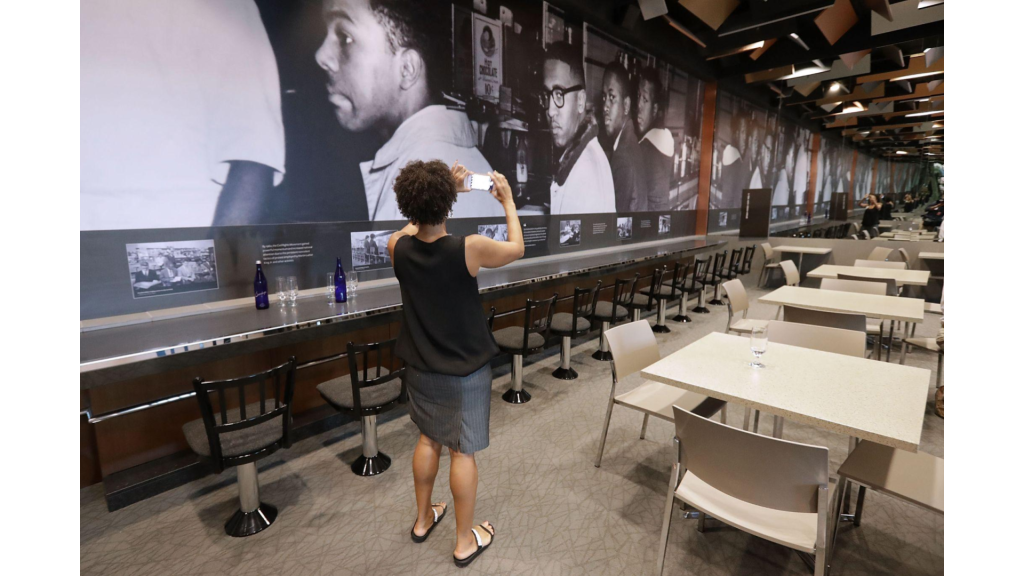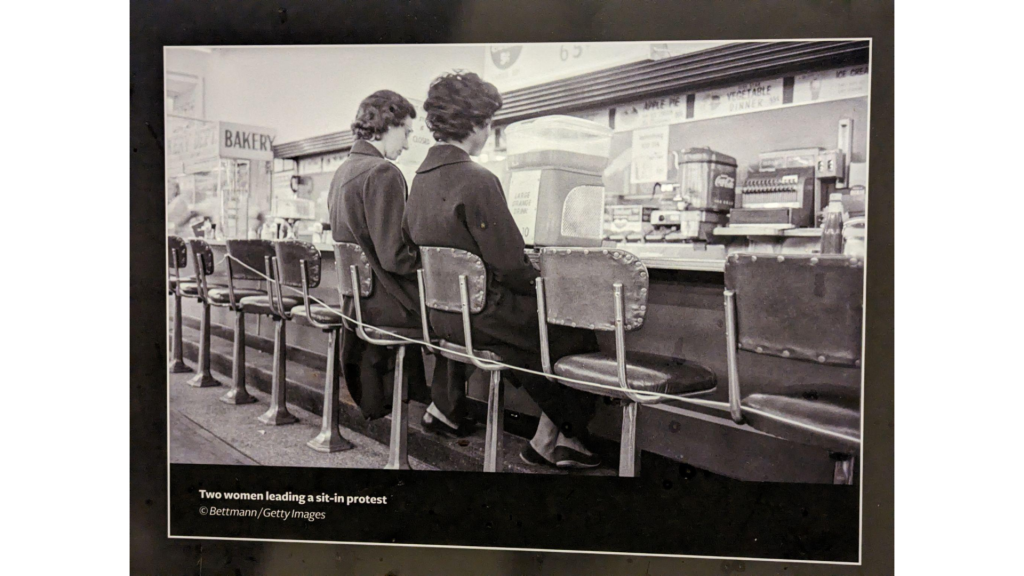During my study leave a few weeks ago I went, once again, to the Museum of African American History and Culture. I went again in part to see the wonderful exhibit on Afro-futurism, eager to experience it without the distraction of two active curious toddlers. If you missed our field trip to see that last year, it’s not too late! We need to find ways to celebrate imagination.
And I went to sit for a minute in the cafeteria space, because I always make sure to center food when I’m taking a day for thought inducing adventures., and that’s one of the best museum cafeterias in the city- and yes, you can absolutely tell me your museum cafeteria favorites later, dear ones.

Anyway, I got my small baked good treat and went to the back of the cafeteria, where they had a long counter set up to look a bit like an extended version of the famous greensboro lunch counter from that first sit in, with a big photo of that protest filling the wall to the ceiling. They also have smaller photos displayed, closer to the seating, and I found myself in front of a picture titled, simply “two women leading a sit-in protest”.

I meant to focus on the book I’d brought with me, on my baked treat, on what I might do with the rest of my day.
But I found myself simply sitting with those two women, across the distance of time and the difference of our circumstances.
Thinking about our theme of Service in a different way- about what it meant to be refused service, and what it meant to refuse to serve, and who we were asking.
I found myself spending the rest of the day dwelling in the reality of 400 years of chattel slavery on this continent, on Jim Crow, on the women of the civil rights movement and present day Black women religious leaders.
Thinking about how “We have a liberator theology that says we are all responsible for getting us all free”, as Religious Educator Christina Rivera talked about in the panel I went to Friday.
I think about the work all of us are called to do, as Unitarian Universalists, to take liberation seriously, and how that’s making sure we’re all served, right- not separated, not marginalized, but served from the welcome table.
Invited to eat our beautifully imperfect pie together, to connect with each other and with the stories of those who came before us..
Earlier I told the story of Georgia Gilmore, who sustained the Montgomery Bus Boycott by selling pies and other baked goods, whose kitchen and dining room nurtured so much of the Civil Rights Movement even after that battle was won.
I love that story because it draws calls to us to look for those who are so often on the margins of the big stories we tell.
We have carved the story of the Rev. Dr. Martin Luther King Jr into the rock of this country in the most literal way possible, but what about the others who were part of that movement- we’ve lifted up Angelic Troublemaker Bayard Rustin this year, pushed to the sidelines for being out and proud as a gay man, whose Quaker values and brilliant mind shaped the successful tactics of the Civil Rights Movement- and we’ve pushed even further to the margins the women of the Civil Rights Movement, of SNCC and the Black Panthers and beyond.
We’ve been working, too, as Unitarian Universalists, not to push the women into the margins of how we tell the story of our own tradition, we’ve watched our tradition be shaped and changed by women more and more- we finally even started electing women in the position of president of our Denomination- first Rev. Susan Frederick Gray and last summer the Rev. Dr. Sofia Betancourt, who of course is also one of our leading womanist theologians.
Do y’all now what Womanism is?
It’s a term first defined by Alice Walker, for a black feminist or feminist of color- Walker famously said Womanist is to feminist as purple is to lavender.
Dr. Wil Gafney says, “most simply, womanism is black women’s feminism… it emerged as black women’s intellectual and interpretive response to racism and classism in feminism and its articulation and in response to sexism in black liberationist thought. Womanism includes the radical equalitarianism of feminism, the emancipatory ethic and reverence for black physical and cultural aesthetics of the black liberation movement, and the transformational trajectories of both movements…”
I’ve been spending a lot of time listening to Rev. Wil Gafney, who identifies herself on social media as a womanist biblical scholar by training, public theologian & activist by necessity, Episcopal priest w/ a foot in the Black Church, sci-fi/fantasy & vampire geek, author, professor, public commentator on politics film & TV, cat companion & plant killer. She’s also a member of a synagogue and a practitioner of midrash and a former Army Chaplain. Basically a thoroughly amazing human.
I appreciate her reminders that women like me cannot be a womanist, because I am white- I’m always going to be a white feminist, but I can aim to be in collaboration with womanism, just like I aim to be an accomplice in the work of anti-racism.
I wanted to de center myself a little extra today, which is part of why I’m talking to you from over here and not up there at the pulpit.
In the Christian Calendar, today churches everywhere are honoring the fourth Sunday of Lent- a time, Dr. Gafney tells us, traditionally focused on joy and rejoicing, with a theme is the joy of love, and the love we ought to have for each other and God’s love for the World.
In her Womanist Lectionary, she pulls from the Gospel of John 4:7- Beloved, let us love one another, because love is from God and everyone is born of God and knows God. Whoever does not love does not know God, for God is love…. Beloved, if God loves us thus, we ought also love one another. God no one has ever seen. Yet if we love one another, God lives in us, and God’s love is made complete in us.
As Unitarian Universalists, we as a tradition don’t have a set stance on God- some of us believe in God, some of us believe in Good, some of us find our spiritual connection in nature, or in polytheistic traditions ancient and new.
What we do have a firm stance on is love- Love is at the center of our tradition- not the commercialized romantic love now on clearance at the CVS, but the love that calls us to action, to relationship, to compassion and care and courage. For sure we know that if we love each other- if we care for each other in real embodied ways, that Good lives in us and through us.
We celebrate love as an action word. Love that is irrational, like the mathematical symbol pi, love that is sweet and nourishing… like the pies Georgia Gilmore baked, that many of you bake. Love that reminds us lift up the stories and the people that those in power would have us forget, to collaborate and to use our sacred imaginations together. Love that reminds us that white supremacy culture serves none of us, but that care and compassion and courage benefit us all. That reminds us to sit with each other, across our differences, to pause and be present with each other and ourselves. For love to live in us and through us, we need each other.
We must make sure that ours is a welcoming table- where those who have historically been pushed to the margins know they will be served, and nourished, where to serve each other is an honor born from the love we have for each other and our community. Where we honor those who serve us, and have served us- which, also, yes, means literally if you go out to brunch or what have you after this service, I remind you that our values call you to tip your waiter as much as you can and at least 20%, that’s the new minimum, friends.
May this be a community, too, where we honor rest, and invite each other into deep rest, and generally rebel against a system that tells us our value is only in what we produce and how we serve. May we remember, as Religious Educator Joy Berry put it: “We too are the ancestors of what will come”
May we know our own worthiness, and know we are loved.

